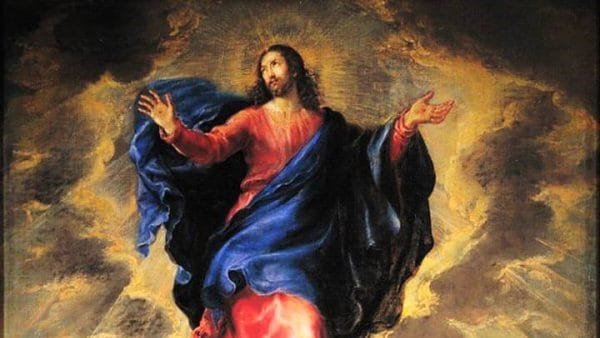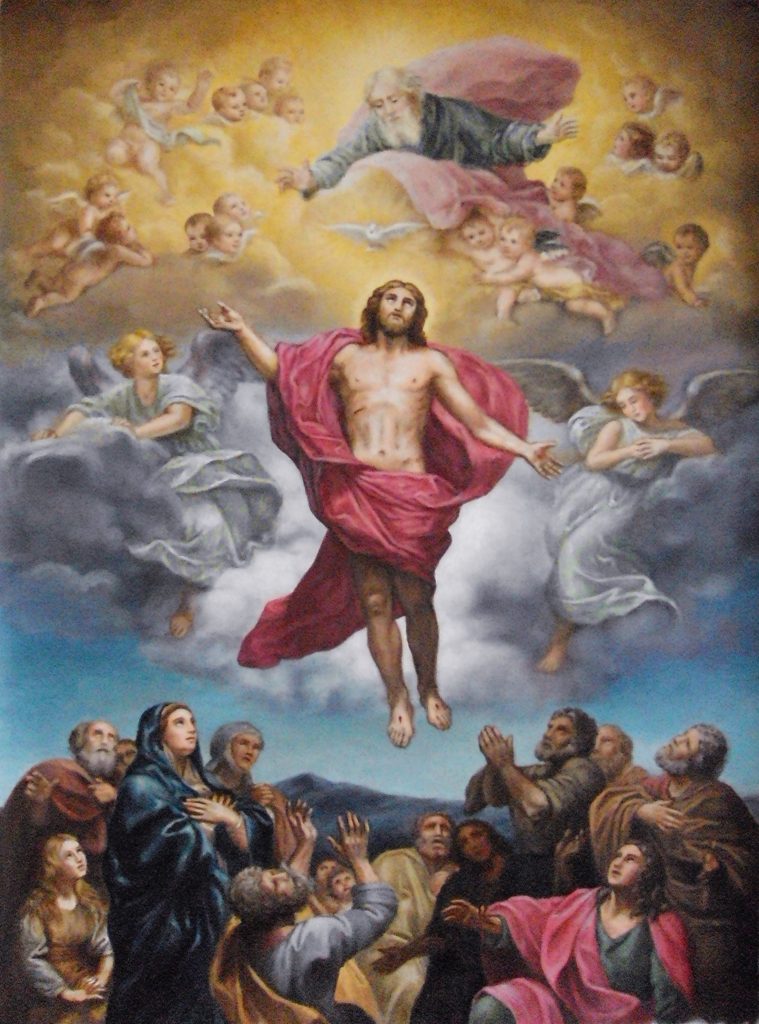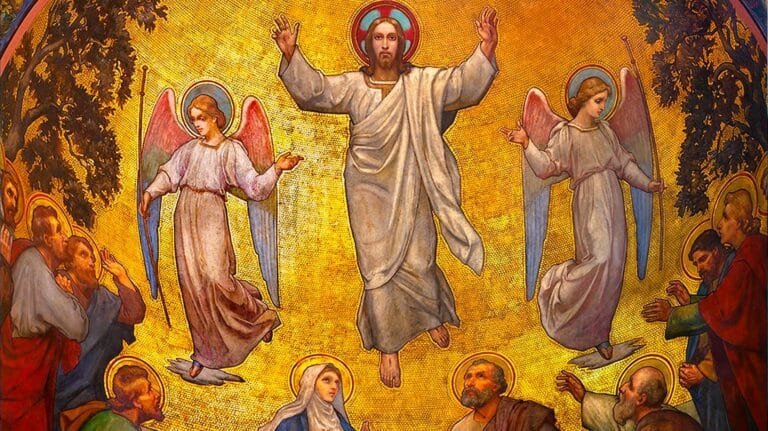POPE BENEDICT XVI ON THE ASCENSION OF THE LORD.
Below you have a two homilies and a Regina caeli address given by Pope Benedict XVI for your personal reading and meditation in preparation for the Ascension of the Lord.

LINKS
Homily, Mass in Krakow, 28 May 2006
Homily, Cassino, Piazza Miranda Sunday, 24 May 2009
Regina caeli address, 20 May 2012
Homily, Mass in Krakow, 28 May 2006
“Men of Galilee, why do you stand looking up to heaven?” (Acts 1:11).
Brothers and Sisters, today in Błonie Park in Kraków we hear once again this question from the Acts of the Apostles. This time it is directed to all of us: “Why do you stand looking up to heaven?” The answer to this question involves the fundamental truth about the life and destiny of every man and woman.
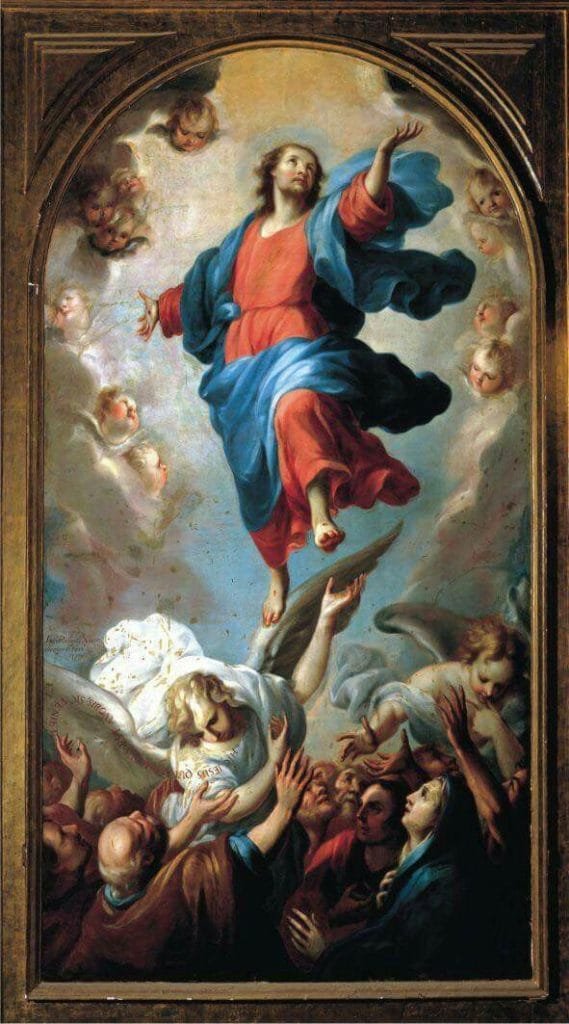
The question has to do with our attitude to two basic realities which shape every human life: earth and heaven. First, the earth: “Why do you stand?” – Why are you here on earth? Our answer is that we are here on earth because our Maker has put us here as the crowning work of his creation. Almighty God, in his ineffable plan of love, created the universe, bringing it forth from nothing. Then, at the completion of this work, he bestowed life on men and women, creating them in his own image and likeness (cf. Gen 1:26-27). He gave them the dignity of being children of God and the gift of immortality. We know that man went astray, misused the gift of freedom and said “No” to God, thus condemning himself to a life marked by evil, sin, suffering and death. But we also know that God was not resigned to this situation, but entered directly into humanity’s history, which then became a history of salvation. “We stand” on the earth, we are rooted in the earth and we grow from it. Here we do good in the many areas of everyday life, in the material and spiritual realms, in our relationships with other people, in our efforts to build up the human community and in culture. Here too we experience the weariness of those who make their way towards a goal by long and winding paths, amid hesitations, tensions, uncertainties, in the conviction that the journey will one day come to an end. That is when the question arises: Is this all there is? Is this earth on which “we stand” our final destiny?
And so we need to turn to the second part of the biblical question: “Why do you stand looking up to heaven?” We have read that, just as the Apostles were asking the Risen Lord about the restoration of Israel’s earthly kingdom, “He was lifted up and a cloud took him out of their sight.” And “they looked up to heaven as he went” (cf. Acts 1:9-10). They looked up to heaven because they looked to Jesus Christ, the Crucified and Risen One, raised up on high. We do not know whether at that precise moment they realized that a magnificent, infinite horizon was opening up before their eyes: the ultimate goal of our earthly pilgrimage. Perhaps they only realized this at Pentecost, in the light of the Holy Spirit. But for us, at a distance of two thousand years, the meaning of that event is quite clear. Here on earth, we are called to look up to heaven, to turn our minds and hearts to the inexpressible mystery of God. We are called to look towards this divine reality, to which we have been directed from our creation. For there we find life’s ultimate meaning.
[…]
Dear brothers and sisters, I have taken as the motto of my pilgrimage to Poland in the footsteps of John Paul II the words: “Stand firm in your faith!” This appeal is directed to us all as members of the community of Christ’s disciples, to each and every one of us. Faith is a deeply personal and human act, an act which has two aspects. To believe means first to accept as true what our mind cannot fully comprehend. We have to accept what God reveals to us about himself, about ourselves, about everything around us, including the things that are invisible, inexpressible and beyond our imagination. This act of accepting revealed truth broadens the horizon of our knowledge and draws us to the mystery in which our lives are immersed. Letting our reason be limited in this way is not something easy to do. Here we see the second aspect of faith: it is trust in a person, no ordinary person, but Jesus Christ himself. What we believe is important, but even more important is the One in whom we believe.
Saint Paul speaks of this in the passage from the Letter to the Ephesians which we have heard today. God has given us a spirit of wisdom and “enlightened the eyes of our hearts, that we may know what is the hope to which he has called us, the riches of his glorious inheritance in the saints, and the immeasurable greatness of his power in us who believe, according to the working of his great power in Christ” (cf. Eph 1:17-20). Believing means surrendering ourselves to God and entrusting our destiny to him. Believing means entering into a personal relationship with our Creator and Redeemer in the power of the Holy Spirit, and making this relationship the basis of our whole life.
Today we heard the words of Jesus: “You shall receive power when the Holy Spirit has come upon you; and you shall be my witnesses in Jerusalem and in all Judaea and Samaria, and to the end of the earth” (Acts 1:8). Centuries ago these words reached Poland. They challenged, and continue to challenge all those who say they belong to Christ, who consider his to be the greatest cause. We need to be witnesses of Jesus, who lives in the Church and in human hearts. He has given us a mission. On the day he ascended to heaven, he said to his Apostles: “Go into all the world and preach the Gospel to the whole creation … And they went forth and preached everywhere, while the Lord worked with them and confirmed the message by the signs that attended it” (Mk 16:15,20). Dear brothers and sisters! When Karol Wojtyła was elected to the See of Peter in order to serve the universal Church, your land became a place of special witness to faith in Jesus Christ. You were called to give this witness before the whole world. This vocation of yours is always needed, and it is perhaps even more urgent than ever, now that the Servant of God has passed from this life. Do not deprive the world of this witness!
Before I return to Rome to continue my ministry, I appeal to all of you in the words spoken here by Pope John Paul II in 1979: “You must be strong, dear brothers and sisters. You must be strong with the strength that comes from faith. You must be strong with the strength of faith. You must be faithful. Today, more than in any other age, you need this strength. You must be strong with the strength of hope, the hope that brings perfect joy in life and which prevents us from ever grieving the Holy Spirit! You must be strong with love, the love which is stronger than death … You must be strong with the strength of faith, hope and charity, a charity that is conscious, mature and responsible, and which can help us at this moment of our history to carry on the great dialogue with man and the world, a dialogue rooted in dialogue with God himself, with the Father, through the Son in the Holy Spirit, the dialogue of salvation” (Homily, 10 June 1979, no. 4).
I too, Benedict XVI, the Successor of Pope John Paul II, am asking you to look up from earth to heaven, to lift your eyes to the One to whom succeeding generations have looked for two thousand years, and in whom they have discovered life’s ultimate meaning. Strengthened by faith in God, devote yourselves fervently to consolidating his Kingdom on earth, a Kingdom of goodness, justice, solidarity and mercy. I ask you to bear courageous witness to the Gospel before today’s world, bringing hope to the poor, the suffering, the lost and abandoned, the desperate and those yearning for freedom, truth and peace. By doing good to your neighbour and showing your concern for the common good, you bear witness that God is love.
I ask you, finally, to share with the other peoples of Europe and the world the treasure of your faith, not least as a way of honouring the memory of your countryman, who, as the Successor of Saint Peter, did this with extraordinary power and effectiveness. And remember me in your prayers and sacrifices, even as you remembered my great Predecessor, so that I can carry out the mission Christ has given me. I ask you to stand firm in your faith! Stand firm in your hope! Stand firm in your love! Amen!
Homily, Cassino, Piazza Miranda Sunday, 24 May 2009
Dear Brothers and Sisters,
“You shall receive power when the Holy Spirit has come upon you; and you shall be my witnesses in Jerusalem and in all Judea and Samaria and to the end of the earth” (Acts 1: 8). With these words, Jesus took his leave of the Apostles, as we heard in the First Reading. Immediately afterwards the sacred Author adds that “as they were looking on, he was lifted up, and a cloud took him out of their sight” (Acts 1: 9). This is the mystery of the Ascension that we are celebrating today. But what do the Bible and the Liturgy wish to tell us by saying that Jesus “was lifted up”? We cannot understand the meaning of these words from a single text or from a single book of the New Testament but rather by listening attentively to the whole of Sacred Scripture. In fact the verb “to lift up” was originally used in the Old Testament and refers to royal enthronement. Thus Christ’s Ascension means in the first place the enthronement of the Crucified and Risen Son of Man, the manifestation of God’s kingship over the world.
However, there is an even deeper meaning that is not immediately perceptible. In the passage from the Acts of the Apostles it is said first that Jesus was “lifted up” (v. 9) and then it says “taken up” (v. 11). The event is not described as a journey to on high but rather as an action of the power of God who introduces Jesus into the space of closeness to the Divine. The presence of the cloud that “took him out of their sight” (v. 9), recalls a very ancient image of Old Testament theology and integrates the account of the Ascension into the history of God with Israel, from the cloud of Sinai and above the tent of the Covenant in the desert, to the luminous cloud on the mountain of the Transfiguration.
To present the Lord wrapped in clouds calls to mind once and for all the same mystery expressed in the symbolism of the phrase, “seated at the right hand of God“. In Christ ascended into Heaven, the human being has entered into intimacy with God in a new and unheard-of way; man henceforth finds room in God for ever. “Heaven“: this word Heaven does not indicate a place above the stars but something far more daring and sublime: it indicates Christ himself, the divine Person who welcomes humanity fully and for ever, the One in whom God and man are inseparably united for ever. Man’s being in God, this is Heaven. And we draw close to Heaven, indeed, we enter Heaven to the extent that we draw close to Jesus and enter into communion with him. For this reason today’s Solemnity of the Ascension invites us to be in profound communion with the dead and Risen Jesus, invisibly present in the life of each one of us.
In this perspective we understand why the Evangelist Luke says that after the Ascension the disciples returned to Jerusalem “with great joy” (24: 52). Their joy stems from the fact that what had happened was not really a separation, the Lord’s permanent absence: on the contrary, they were then certain that the Crucified-Risen One was alive and that in him God’s gates, the gates of eternal life, had been opened to humanity for ever. In other words, his Ascension did not imply a temporary absence from the world but rather inaugurated the new, definitive and insuppressible form of his presence by virtue of his participation in the royal power of God. It was to be up to them, the disciples emboldened by the power of the Holy Spirit, to make his presence visible by their witness, preaching and missionary zeal. The Solemnity of the Lord’s Ascension must also fill us with serenity and enthusiasm, just as it did the Apostles who set out again from the Mount of Olives “with great joy”. Like them, we too, accepting the invitation of the “two men in dazzling apparel”, must not stay gazing up at the sky, but, under the guidance of the Holy Spirit must go everywhere and proclaim the saving message of Christ’s death and Resurrection. His very words, with which the Gospel according to St Matthew ends, accompany and comfort us: “and lo, I am with you always, to the close of the age“ (Mt 28: 19).
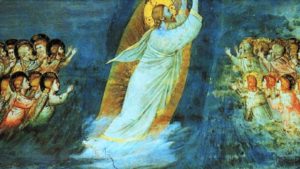
Dear brothers and sisters, the historical character of the mystery of Christ’s Resurrection and Ascension helps us to recognize and understand the transcendent condition of the Church which was not born and does not live to compensate for the absence of her Lord who has “disappeared” but on the contrary finds the reason for her existence and mission in the invisible presence of Jesus, a presence working through the power of his Spirit. In other words, we might say that the Church does not carry out the role of preparing for the return of an “absent” Jesus, but, on the contrary, lives and works to proclaim his “glorious presence” in a historical and existential way. Since the day of the Ascension, every Christian community has advanced on its earthly pilgrimage toward the fulfilment of the messianic promises, fed by the word of God and nourished by the Body and Blood of her Lord. This is the condition of the Church, the Second Vatican Council recalls, as she ” “presses forward amid the persecutions of the world and the consolations of God’, announcing the Cross and death of the Lord until he comes” (Lumen Gentium, n. 8).
Brothers and sisters of this beloved diocesan community, today’s Solemnity urges us to consolidate our faith in the Real Presence of Jesus in history: without him we can do nothing effective in our life or our apostolate. It is he, as the Apostle Paul recalls in the Second Reading, whose “gifts were that some should be apostles, some prophets, some evangelists, some pastors and teachers, for the equipment of the saints, for the work of ministry, for building up the Body of Christ”, that is, the Church. And this is in order that we “attain to the unity of the faith and of the knowledge of the Son of God” (Eph 4: 11-13), since the common vocation of one and all is to form “one body and one spirit, just as you were called to the one hope that belongs to your call” (Eph 4: 41). My Visit today fits into this perspective. As your Pastor noted, its purpose is to encourage you “to build, found and rebuild” your diocesan community ceaselessly on Christ. How? St Benedict himself points out the way to us in his Rule when he recommends that we prefer nothing to Christ: “Christo nihil omnino praeponere” (LXII, 11).
[…]
Regina caeli address, 20 May 2012
Dear Brothers and Sisters,
Forty days after the Resurrection — according to the Book of the Acts of the Apostles — Jesus ascended into Heaven, that is he returned to the Father, by whom he had been sent into the world. In many countries this mystery is celebrated not on Thursday but today, the following Sunday. The Ascension of the Lord marks the fulfillment of salvation that started with the Incarnation. After he had instructed his disciples for the last time, Jesus was taken up into Heaven (cf. Mk 16:19). He, however, “was not separated from our condition” (cf. Preface); indeed, in his humanity, he took man with him into the intimacy of the Father and thus revealed the final destination of our earthly pilgrimage. As he descended from Heaven for us, and for us suffered and died on the Cross, so for us he rose and ascended to God, who, therefore, is no longer far away.
St Leo the Great explains that with this mystery “not only is the immortality of the soul proclaimed, but also that of the body. Today in fact, not only are we confirmed as possessors of paradise, but in Christ have also penetrated the heights of Heaven” (De Ascensione Domini, Tractatus 73, 2.4: CCL 138 A, 451.453). This is why the disciples, when they saw the Master rise from the ground and ascend upwards, they were not disheartened, as one might expect, instead, they were overcome with joy and felt compelled to proclaim Christ’s victory over death (cf. Mk 16:20). And the Risen Lord worked in each of them, bestowing on each his own charism. St Paul writes further: “He gave gifts to men … and his gifts were that some should be apostles, some prophets, some evangelists, some pastors and teachers … for building up of the body of Christ … to the measure of the stature of the fullness of Christ” (Eph 4:8, 11-13).
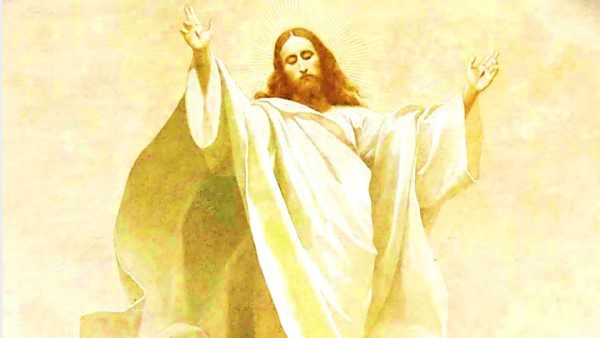
Dear friends, the Ascension tells us that in Christ our humanity is brought to the heights of God; thus, every time we pray, earth is united to Heaven. And like incense, burning, its scent is carried on high, hence, when we raise our prayer to the Lord with confidence in Christ, it travels across Heaven and reaches God himself and is heard and answered by Him. In the well-known work by St John of the Cross, The Ascent of Mount Carmel, we read that “in order to obtain the fulfilment of the petitions which we have in our hearts, there is no better way than to direct the energy of our prayer to the thing that most pleases God. For then not only will He give that which we ask of Him, which is salvation, but also that which He sees to be fitting and good for us, although we pray not for it” (Book III, ch. 44, n. 2).
Finally let us beseech the Virgin Mary, that she may help us to contemplate the heavenly goods, which the Lord promises us, and to become ever more credible witnesses of his Resurrection, of true Life.
SOURCE: VATICAN.VA
EMPHASIS MINE.
REGINA CÆLI
Saint Peter’s Square
VI Sunday of Easter B, 21 May 2006
Dear Brothers and Sisters,
The book of the Acts of the Apostles recounts that Jesus, after his Resurrection, appeared to the disciples for 40 days and then “was lifted up, and a cloud took him out of their sight” (Acts 1: 9).
It is the Ascension, the feast we will celebrate on Thursday, 25 May, though in some countries it has been transferred to next Sunday.
The meaning of this final gesture of Jesus is twofold. In the first place, ascending on high, he clearly reveals his divinity: he returns to where he came from, that is, to God, after having fulfilled his mission on earth. Moreover, Christ ascends into heaven with the humanity he has assumed and which he has resurrected from the dead: that humanity is ours, transfigured, divinized, made eternal.
Therefore, the Ascension reveals the “most high calling” (Gaudium et Spes, n. 22) of every human person, called to eternal life in the Kingdom of God, kingdom of love, light and peace.
Celebrated on the feast of the Ascension is the World Day of Social Communications, initiated by the Second Vatican Council and now in its 40th year. This year’s theme is: “Media: communication, communion, cooperation”.
The Church looks with attention at the media, because it is an important vehicle to spread the Gospel and to favour solidarity between peoples, calling attention to the major problems that still mark them profoundly.
Today, for example, the “Walk the World” [to fight hunger] initiative of the United Nations World Food Programme, seeks to sensitize governments and public opinion on the need for concrete and timely action to guarantee to all, especially children, “freedom from hunger”.
With prayer I am close to this demonstration, which is taking place in Rome and in other cities of some 100 nations.
I earnestly hope that, thanks to the contribution of all, the plague of hunger will be surmounted which still afflicts humanity, putting in great danger the hope of life of millions of people. I am thinking, above all, of the urgent and tragic situation in Darfur, Sudan, where strong difficulties persist to satisfy even the primary food needs of the population.
With the usual recitation of the Regina Caeli we particularly entrust today to the Virgin Mary our brothers and sisters oppressed by the scourge of hunger, all those who come to their aid and those who, through the means of social communication, contribute to consolidating between peoples the bonds of solidarity and peace.
We also pray to Our Lady to make fruitful the Apostolic Trip to Poland which, God willing, I will make from Thursday to next Sunday in memory of beloved John Paul II.
SOURCE: http://www.vatican.va/content/benedict-xvi/en/angelus/2006/documents/hf_ben-xvi_reg_20060521.html
EMPHASIS MINE.
SEE AS WELL:
ASCENSION OF OUR LORD THURSDAY OR SUNDAY. MASS PRAYERS AND READINGS.
THE ASCENSION OF OUR LORD REFLECTION (1): ITS SIGNIFICANCE. Summary vid + full text.
POPE FRANCIS ON THE ASCENSION OF OUR LORD.
POPE BENEDICT XVI ON THE ASCENSION OF OUR LORD.
Summary of Catholic Teaching. TOPIC 11: THE ASCENSION OF OUR LORD
ST. AUGUSTINE ON THE ASCENSION OF OUR LORD.
Stay updated: subscribe by email for free TO OUR NEW WEBSITE www.catholicsstrivingforholiness.org (PUT YOUR EMAIL IN THE SUBSCRIBE WIDGET).
We are also in www.fb.com/Catholicsstrivingforholiness. Kindly help more people in their Christian life by liking our page and inviting your family, friends and relatives to do so as well. Thanks in advance and God bless you and your loved ones! Fr. Rolly Arjonillo
